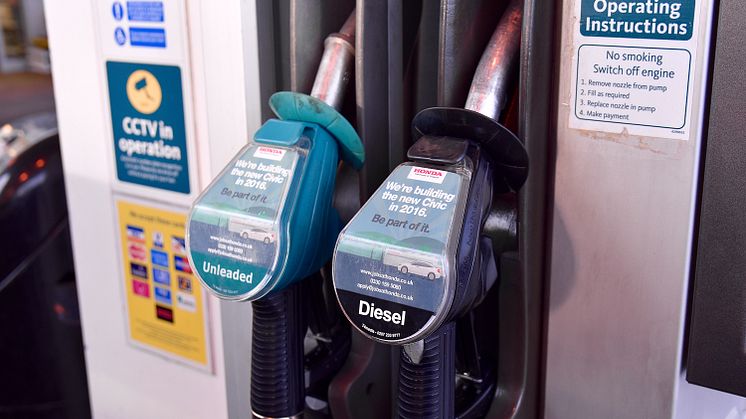
Press release -
Fuel price rises on the horizon after further falls in May
The average price a litre of unleaded petrol fell below the 106p mark in May, the first time in more than four years that the price has dropped to this level, although drivers should be braced for the start of price rises, new RAC Fuel Watch data suggests.*
As the lockdown in England was eased and more drivers headed onto the roads, the cost of refilling a 55-litre family-sized petrol car dropped by £1 to £58.20 on average as prices at forecourts fell more than 3p from 108.95p per litre at the start of May to just 105.81p by 21 May. Drivers of diesel cars also benefitted from a price drop of a similar scale, with the average cost of a litre down from 114.54p to 111.23p, making a tank £1.39 cheaper at £61.52.
The RAC data shows that once again supermarkets are the best places to go for the lowest priced fuel, with all the major retailers having firmly held their low prices for three weeks now. Three retailers – Tesco, Morrisons and Asda – are all selling unleaded for around £1 per litre, while the cheapest diesel can be found for 104.7p at Asda and Morrisons.
These low fuel prices may not be around for very much longer, however. As a result of a rebound in the world oil price, which was up $15.59 in the month to end May at $34.44 a barrel (an 83% increase), wholesale petrol prices rose by 7p during the course of the month, with diesel up 4.5p. The RAC believes that if retailers are to continue with the same pricing strategies they employed before the lockdown, these wholesale price increases could very quickly translate into small increases to drivers at the pumps during June.
RAC fuel spokesman Simon Williams said:
“There’s no doubting that, as the lockdown is eased slightly in different parts of the UK and drivers begin to travel more often, it’s currently cheaper to fill up now than it has been since 2016.
“How long these lower pump prices remain for however is debatable and is largely dependent on events taking place thousands of miles away from the UK. The impact of the coronavirus on world travel and economic activity has dramatically reduced the global demand for oil, which is forcing major oil producing nations such as Saudi Arabia and Russia to desperately agree production cuts to shore up the barrel price. How far they go with these cuts, and how quickly, will be crucial in determining what happens with prices at the pumps over the next few months. Last month, as we expected, the oil price began to creep back up. If this continues in June, a rise in the cost of filling up is almost inevitable.
“Of course drivers still need to be careful about the trips they’re making – while the lockdown has eased a little more in England than in other parts, trips from here to Wales and Scotland shouldn’t be contemplated yet, and with so many basic amenities like public toilets and other facilities still closed the appeal of packing the car up for a daytrip is still unlikely to be very strong.
“For now though, drivers should fill up when they can to benefit from what are the lowest prices for four years. While the impact of the coronavirus is set to be with us for a long while yet, we don’t expect such low pump prices to be.”
Topics
Categories
Notes to Editors
* UK national average pump prices quoted are based on Experian Catalist data from 1 to 29 May 2020, regional data from 30 April to 28 May. Wholesale prices, oil price and the value of sterling are based on data from 1 to 29 May 2020.
About the RAC
The RAC provides complete peace of mind to 12m UK private and business drivers, whatever their motoring needs. Its services include:
- Breakdown assistance. Its highly-skilled, 1,600-strong branded patrol workforce attends more than two million breakdowns every year, fixing on average four out of five vehicles at the roadside. The RAC’s patrol fleet is one of the most advanced in the UK, and was the first to roll out both an All-Wheels-Up recovery system, allowing the vast majority of vehicles to be recovered from a single patrol van, and EV Boost mobile electric vehicle charging units
- Insurance. The RAC is a top-five car insurance broker having surpassed the 500,000 policies-in-force milestone in 2018. It also offers ‘black box’ telematics policies, as well as home and travel insurance
- Other motoring services. The RAC leads in the development of new solutions for business, fleets, electric vehicles and future car technology. Its additional products and services include a personal loans offering, a used car buying website, vehicle inspections and checks, legal services or up-to-the-minute traffic and travel information. It also has a network of Approved Dealers and Approved Garages which combine the trust of RAC brand with local service and convenience
The RAC also works to support the interests of its members and UK drivers on the most important motoring issues which it identifies via the annual RAC Report on Motoring and the RAC Opinion Panel. The Report on Motoring is the longest running analysis of driver opinion in the UK having been published every year since 1989.
For more information about the RAC, visit the RAC website.

